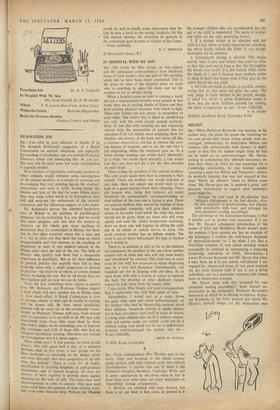LETTERS
Demolition Job Dr. R. F. Tredgold
In Hospital With My Son Mrs. Irene Overall, Dr. N. M. Jacoby
Milton F. R. Leavis, Boris Ford, Arthur Capey Within the Family Malcolm Muggeridge
Books for Overseas Readers Gordon Grimley and Others DEMOLITION JOB Sta,—You refer in your editorial of March 17 to Mr. Kenneth Robinson's suggestion of a Royal Commission on medical education, and especially the teaching of psychiatry, and you publish Professor Titmuss's article also advocating this. As you say, this may not be ideal now, but some investigation is urgently needed.
Most teachers of psychiatry, and many teachers in other subjects, would welcome some investigation of the present position, as a means of assessing and re-arranging that very puzzling jigsaw, the students' curriculum; and even if (after having borne the burden and heat of the day for some fifteen years) they may smile rather wryly at its belatedness, they will still welcome the enthusiasm of the recently converted, and the influential support of your paper.
Mr. Robinson's phrase the admitted backward- ness of Britain in the teaching of psychological medicine' can be misleading. It is true that we would like more progress, and also that the student in AmeriCa on the whole gets more twhing in Psychiatry than his counterpart in Britain, but there can be few other countries where this is true, and it is fair to point out that there has been an entire reorganisation and vast increase in the teaching of psychiatry in most of our medical schools in the fifteen years since the end of the war. The bulk of doctors who qualify now have had a reasonable experience in psychiatry. But so far their influence in general practice has scarcely been felt as they naturally form only a small proportion of doctors in practice—the majority of whom, of course, trained before or during the war. But by all means have an investigation and see how we can do better.
None the less, something more urgent is needed now. Mr. Robinson and Professor Titmuss suggest a plan which will take another ten to fifteen years t( have much effect. A Royal Commission is slow t( arrange, slower to hold and its results in training will be slower still. By then, many psychiatric patients will be cared for in the community—trans- ferred, as Professor Titmuss well says, from trained staff to untrained, or to no staff at all. We may add, transferred from those who want them to those who don't, unless we do something now to improve the awareness and skill of those GPs who had no adequate psychiatric training. Thiss-does not exclude an investigation, but it is more urgent.
What exists now? A few courses for keen practi- tioners, who will spend half a day, or a weekend perhaps, once in five years; a few groups on the lines developed so admirably by Dr. Balint, which are more thorough. But what proportion of all GPs does this include? There is work for all hands; Psychiatrists in teaching hospitals, in post-graduate institutions, and in mental hospitals all over the country to work together to provide more regular teaching for the bulk of GPs. The latter may need ,encouragement to come to courses: they may need some relief from the pressure of their existing work; and even some financial help. Perhaps the Minister would do well to kindle some enthusiasm here be- fore he puts a torch to the mental hospitals. On this will depend whether the transition of patients to the community goes in terms of Ghana or the Congo. —Yours faithfully, 23 Devonshire Street, WI
R. F. TREDGOLD


































 Previous page
Previous page